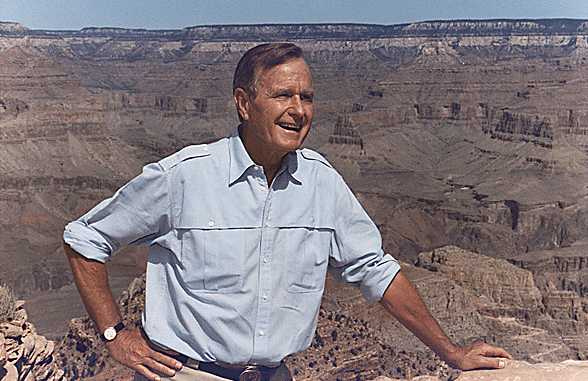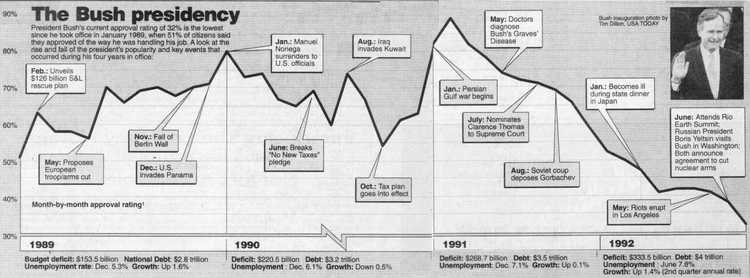
|
Inauguration 1989
|
|
China
|
|
Noriega arrested
|
Jan. 20 - George Herbert Walker Bush inaugurated 41st President, Dan Quayle VP. As a traditional upper-class Republican conservative, Bush was a cheerleader for American consumer capitalism and promoted globalization of American-produced products in a "New World Order" safeguarded by the Reagan Doctrine and arms sales to client countries. However, neither Bush nor Secretary of State Baker had "the vision thing" and instead remained pragmatic caretakers of the Reagan Revolution. The economic recession 1990-92, white collar downsizing, the loss of 2 million jobs, the need to raise taxes to pay for the Reagan deficit, and a hostile Congress controlled by the Democratic party prevented the realization of the new order.
Boris Yeltsin won first free elections in USSR Mar. 26, Solidarity and Lech Welesa won first free elections in Poland June 5; Yeltsin would become chairman of the Russian Supreme Soviet 1990/5/29 and leader of the largest Republic in the USSR and began to challenge President Gorbachev for leadership, finally winning 60% of the popular vote in the presidential election 1991/6/13, disbanded the Supreme Soviet in Sept. 1993, invaded Chechnya Dec. 1994, defaulted in 1998 on $40b IMF loans, replaced by Vladimir Putin in 2000.
Chinese tanks and troops of Deng Xiaping killed 2000 in Tiananmen Square June 5, Bush suspended arms sales to China
Berlin Wall opened at midnight Nov. 10 after the fall of the Erich Honecker regime in East German Oct. 18, and Germany would be united 1990/10/3 as the Federal Republic of Germany led by Helmut Kohl and the parliament in the Berlin Reichstag
Panama invaded by 22,500 U.S. troops Dec. 20 in Op. Just Cause, and Manuel Noriega captured Jan. 4 after seeking asylum in the Vatican embassy Dec. 24, and after relentless rock music blared over loudspeakers of songs by The Animals, Bobby Fuller, and Bruce Springsteen - 1
Nicolae Ceausescu of Rumania executed Dec. 25.

|
"Read My Lips"
|
|
John Major
|
Nelson Mandela released after 27 years jail in South Africa Feb. 11, part of reforms of President Frederick W. de Klerk
Bush reversed campaign pledge and supported bipartisan bill to raise taxes June 26; but a recession began in late 1990 through 1992 due to effect of the enormous federal debt
Bush signed the Americans with Disabilities Act to mandate access in public facilities
Iraq invaded Kuwait Aug. 2, Sheik Jaber al-Ahmed al-Sabah fled to Saudi Arabia; UN voted Nov. 29 to authorize the use of force against Iraq after Jan. 15, 1991
Helsinki summit Sept. 9 of Bush and Gorbachev, agreement to support U.N. sanctions against Iraq's Saddam Hussein
John Major on Nov. 27 replaced Margaret Thatcher, who had ruled 11 years as prime minister and leader of the Conservative Party in Britain, the country that no longer was an island Dec. 1 when the 30-mile tunnel completed its last link to France under the English Channel

|
Rodney King
|
|
Boris Yeltsin
|
|
new flag
|
|
Orrin Hatch
|
Congress Jan. 12 supported UN authorization of force against Iraq
Op. Desert Storm air attacks fell on Baghdad Jan. 16, beginning the Gulf War against Iraq
General Norman Schwarzkopf led ground troops invasion of Iraq Feb. 23, growing in size to 690,000 troops that included 425,000 Americans; 100,000 Iraqis died, 141 Allied soldiers; 800 oil wells set on fire as Iraqis retreated
Bush announced at 9 pm Feb. 28 "Kuwait is liberated. Iraq's army is defeated. I am pleased to announce that at midnight tonight, exactly 100 hours since ground operations began and six weeks since the start of Operation Desert Storm, all United States and coalition forces will suspend offensive operations."
Bush exalted "we've kicked the Vietnam syndrome once and for all" but fell victim to the Korean War syndrome by leaving Saddam Hussein in power
The beating of Rodney King by four LA police Mar. 3 was captured on videotape, riots would break out May 1-2, 1992, after an all-white jury acquitted the four policemen, and Bush mobilized 5000 Marines and troops to help the National Guard restore order. Like rap music, the Rodney King videotape expressed in the mass media the frustration and anger of the urban poor.
Iraq captured Kirkuk Mar. 31 to defeat Kurdish revolt, and put down a Shi'ite revolt in the south. American and British forces refused to intervene.
South Africa repealed the last apartheid law June 17
Serbia began invasion of Slovenia and Croatia June 29 to prevent the breakup of Yugolsavia
Clarence Thomas nominated July 1, attacked on TV by Orrin Hatch in Oct hearings.
Bush signed the Madrid Pact July 4 amending the 1961 Antarctic Treaty to ban mining and oil drilling.
START-I accord signed in Moscow in July to limit delivery vehicles to 1600 and warheads to 6000, effectively reducing both arsenals in half; Yeltsin and Bush would sign the START-II treaty before Bush left office Jan. 1993 to further reduce the arsenals and eliminate MIRVs completely; Yeltsin and Clinton would sign the START-III treaty in 1997 to cut one-third more, but the Russian parliament balked at ratification
Gorbachev, with the help of Yeltsin, survived a coup attempt Aug. 21 by hardliners; the USSR was officially dissolved Sept. 5; Soviet troops withdrawn from Cuba Sept. 11
Gorbachev resigned Dec. 25 and the red flag was lowered from the Kemlin, replaced by the red and white and blue flag of Russia, political power and control of nuclear weapons passed to Boris Yeltsin, President of Russia, the largest of the 11 republics in the new Commonwealth of Independent States.

|
Mike Tyson
|
|
Ross Perot
|
|
"Men" of the Year 1991/1/7
|
Boutros Boutros Ghali of Egypt became UN Secretary-General Jan. 1, began humanitarian aid to Somalia devastated by civil war since the fall of Mohammed Siad Barre 12 months earlier
Treaty of European Union and the Final Act signed at Maastrict in Holland Feb. 7 by 12 nations creating the European Union
Mike Tyson, at 25 the youngest heavyweight boxing champion, was sentenced Mar. 26 to 6 years jail for the rape of a Miss Black America contestant (released after only 2 years, he beat Peter McNeeley in 89 seconds in 1995); "Teflon Don" John Gotti was convicted Apr. 2 on 5 counts of murder (he would die in jail 1999); Manuel Noriega was convicted in Miami Apr. 9 of drug trafficking (and is still in jail)
Bush refused to join 178 nations signing treaties at the Earth Summit in Rio de Janeiro June 14 to prevent global warming; although Clinton signed in 1993 at the urging of pro-environmentalist Al Gore who wrote Earth in the Balance, the Senate did not ratify
Col Michael Jones led a Canadian battalion through a Serb roadblock July 2 to open the airport in the besieged Bosnian city of Sarajevo; U.S. and British and French planes began humanitarian airlift to the city; soon images of death camps, murder, rape, and "ethnic cleansing" were shown around the world
Bush signed the North American Free Trade Agreement with Mexico and Canada Aug. 12
Hurricane Andrew hit Florida Aug. 24 and caused $25 billion damage, the most expensive natural disaster in American history
Televised presidential debate Oct. 11 at Washington University in St. Louis
Bill Clinton (43.3%) defeated Bush (37.7%) and Ross Perot (19%) in the presidential election Nov. 4. The former Arkansas governor was the first Democratic president elected since 1976, and the first to be born after WWII, and the first to break the Republican grip on the South since 1968.
Bush in Op. Restore Hope sent Marines to Somalia Dec. 9 to protect airport and humanitarian aid efforts in Mogadishu from warlord Mohamed Farah Aidid, but Clinton would pull most of these forces out in 1993
Bush proclaimed no-fly zone over Bosnia to prevent Serbian air attacks, but yielded to British and decided not to attack Serb airfields

Cruise missiles fired Jan. 17 from U.S. warships at Iraq destroyed nuclear-weapons plant, but also damaged a Baghdad hotel and killed 3 civilians
Links:
- George Bush Presidential Library at Texas A&M
- dedication ceremony from college newspaper The Battalion
- History publications from the Joint Chiefs of Staff electronic Joint Doctrine
- Operation Just Cause - Panama, Dec. 20, 1989 (PDF)
- Operation Urgent Fury - Grenada, Oct. 25, 1983 (PDF)
- Hurricane Andrew and Hurricane history from NOAA
- Operation Just Cause links
- Reagan Library QTVR images from American Experience
- Yahoo index for President Bush
- Google directory for George Herbert Walker Bush

